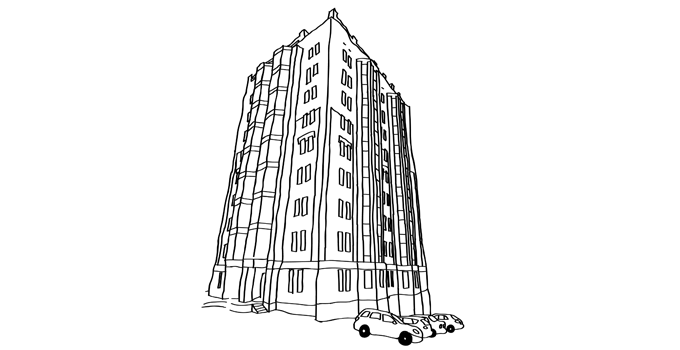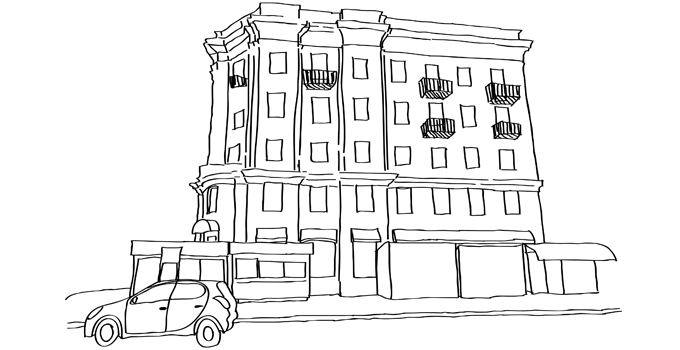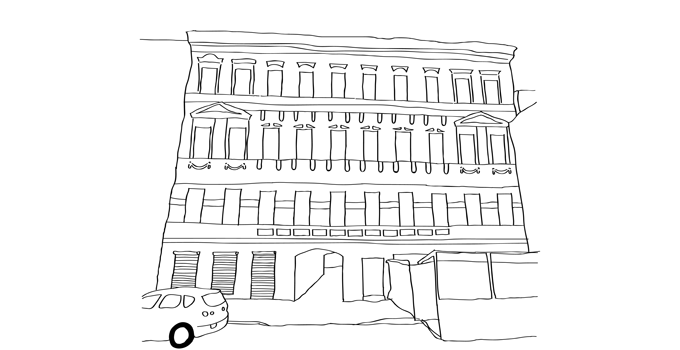Немно́го о языке́ 2.4 Но́вые адреса́
An Introduction to Verb Conjugation
So far you have encountered a few forms of Russian verbs. A fuller discussion of verb conjugation will come in Unit 3, but already you have seen forms such as:
 |
 |
 |
| Ке́йтлин: "Вот дом, где я живу́". | Вот дом, где живёт То́ни. | А вот общежи́тие, где живу́т студе́нты. |
The forms of a Russian verb will change based on their subject – the doer of the action. The subject of a verb can be a personal pronoun (like я or он), a proper name (like То́ни), or a noun (like студе́нты). Each verb form consists of a stem to which we add an ending that corresponds to the subject. When you change the verb ending to match the subject you are conjugating the verb. For example, the stem of the verb "to live/to reside" is жив- and the ending for the first person я is –у: я живу́. For the third person singular он/она́/оно́ the ending is: ёт and for the third person plural они́, the ending is –ут: они́ живу́т.
Упражне́ние 1
Select the subject pronoun for each of the given verb forms.
Упражне́ние 2
Russian usually does NOT leave out the subject pronouns. Review the subject pronouns by selecting all of their English equivalents.
Note the following:
- Russians actually do use the subject pronouns with verbs (я, ты, он, она́, мы, вы, они́) most of the time, even though all of the endings are unique. If you have studied Spanish or another language that normally leaves pronouns out, you will need to get used to using them in Russian.
- Since Russian word order is relatively flexible, the subject of the verb does not always come before the verb. (More will be said about word order in Unit 3).
- Unlike in English, in Russian there is only one present tense form of a verb. So, for example, depending on the context, the form я живу́ could mean "I live," "I am living," or "I do live" . Unlike English, Russian does not use auxiliary verbs to convey progressive ("am living") or emphatic ("do live") meanings.
Говори́м Пра́вильно и краси́во
The forms of the verb to live present three pronunciation challenges.
ж- и́ли з-? Be sure to distinguish the initial sounds in the words живу́т (they live) and зову́т (they call). Remember that the letter ж makes the sound that you hear in English words like ”pleasure“ while the letter з makes a sound like [z], as in zebra.
Упражне́ние 3
Listen to the recordings and fill in the missing letters in the words that you hear. Some of the words will be unfamiliar to you, but you should still be able to hear the difference. After selecting the initial consonants, listen to the recording again and repeat the words as you hear them.
живёт (he/she lives)
Remember that the letter ё represents a softening of the previous consonant plus the sound [о]. Russian has the word живёт (he/she lives) and the word живо́т (tummy). The only difference between them is that the в of живёт is soft (palatalized) while the в in живо́т is hard (unpalatalized).
Упражне́ние 4. Како́е э́то сло́во — живёт, и́ли живо́т?
Listen to the recordings and select the word that you hear. When you have checked your answers, listen to the recordings again and repeat the words, pronouncing them as close to the model as you can . By the end of the exercise you should be better at hearing the difference between the words, and also better at saying each of them.
живу́, живёшь
You may have noticed that in all the forms of "to live" the first syllable is pronounced as though it were spelled [жы], but it always spelled жи-. Recall that in Unit 1 we noted that the consonant ж is always pronounced hard, which means that the middle part of the tongue forms a little spoon and is positioned away from the roof of the mouth. When Russians see the spelling жи, they actually always pronounce it [жы] – but they cannot spell it that way. Remember that the spelling rule you learned in Unit 1 says that after ж you may not write ы, so after the letter ж we instead spell и. In the case of this letter и has no power to soften ж.
Упражне́ние 5
Listen to the words below and repeat them, noting that we see жи but pronounce [жы].
| англи́йские эквивале́нты | |
|---|---|
| гаражи́ | garages |
| жи́ли | (they) lived |
| жир | fat |
| живо́й | lively |
| жира́ф | giraffe |
